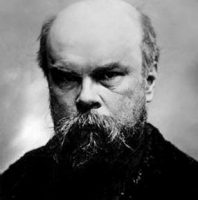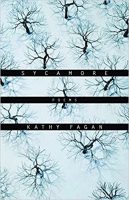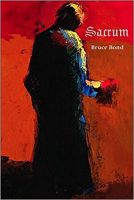March 30, 2017
Edited by David Sanders
Specimen Days
1844 Paul M. Verlaine, France, lyric poet (Sagesse Bonbeur), is born.
1923 Milton Acorn, Canadian poet (d. 1986), is born.
1944 Gerrit Komrij, Dutch poet/essayist (Happy Schizo), is born.
1986 John Ciardi, US poet/interpreter (Dante), dies at 69.
2005 Robert Creeley, American poet (b. 1926), dies.

Happiness once walked side by side with me;
But DOOM knows no reprieve, there's no mistaking:
The worm is in the fruit; in dreaming, waking;
In loving, mourning. And so must it be.
–Happiness once walked side by side with me.
—from “Nevermore” by Paul Verlaine
[trans. Norman Shapiro]
“Happiness once walked side by side with me; / But DOOM knows no reprieve,” – Paul Verlaine
World Poetry
Case Against Bengali Poet Srijato Bandopadhyay for Hurting Hindu Sentiments
A hardline Right-wing group has filed a police complaint against aspiring Bengali poet Srijato Bandopadhyay (42) for a poem hurting Hindu religious sentiments and strongly criticising Uttar Pradesh Chief Minister Yogi Adityanath, following which a First Information Report (FIR) has been booked against Bandopadhyay, who is based in Siliguri.
Crater on Mercury Named after Irish Poet Seamus Heaney on World Poetry Day Thanks to Belfast Student
A student from Belfast has named a crater on Mercury after Irish poet Seamus Heaney, just in time for World Poetry Day. Jack Wright, 25, was given the honour of naming the 120km diameter crater, which he has called Heaney, after he identified it while mapping a section of the planet as part of his research for his PhD with the Open University. It comes a week after a lava field on the planet was named as Gaeilge by an Irish scientist. The naming of Heaney follows a custom – approved by the International Astronomical Union (IAU) – of naming craters on Mercury after deceased artists, authors and poets.
A student from Belfast has named a crater on Mercury after Irish poet Seamus Heaney.
Recent Reviews
The Clinic, Memory Review: Elaine Feinstein’s Passionate Poetry
by Martina Evans

Elaine Feinstein’s mother says “I thought you were going to be clever” towards the end of her new poem Mirror Talk, which opens: “Is that my mother now behind the glass, looking / dark-eyed and weary, as if doubting / whether I can be trusted to count pills . . ?” Feinstein’s answer, “you mistook my precocity for ambition, / but I was only a wistful dreamer,” sums up the mixture of delicacy, precision and honesty before all else that makes her poetry lift its head above the crowd. Here we have a life, a person in the world opened up with intelligence and tact. In the sonnet Loving Don Quixote, about the men in her life who sought honour “without calculation”, she could be describing her own journey, with the final line, “simply to make sense of being alive”, acting as a coda for this outstanding collection spanning half a century of Feinstein’s poetry.
Alan Felsenthal Emerges from His Song Cave and Sings to Us
by John Yau
I do not know when Alan Felsenthal and Ben Estes founded their press The Song Cave, but at some point early on I began subscribing to their chapbook series, published in editions of 100, and got publications by Jennifer Moxley, Lisa Jarnot, Chris Nealon, Charles North, Dana Ward, Monica de la Torre, Fanny Howe, Rod Smith, Jane Choi, and Christopher Edgar, a favorite. As any press should do, they introduced its readers to new poets.
Tradition Is Not What We Think It Is: On Harmony Holiday’s “Hollywood Forever”
by Laura Goode
“I can interrogate any woman’s dream and find blood at the roots,” declares the authoritative, fearless, and virtuosic speaker of Hollywood Forever, the third collection by the poet Harmony Holiday. “She loves you, she / wants you dead, it’s safer there. She is rooting for your rebirth I mean.” That stanza of the poem “Coretta, Trauma, and Romance,” superimposed upon an image of Jacqueline Kennedy and Coretta Scott King clasping black-gloved hands, hovers just above their high hair, with King shrouded in a black mourning veil.
Elaine Feinstein’s mother says “I thought you were going to be clever” towards the end of her new poem “Mirror Talk.”
Broadsides
Derek Walcott and the Poetry of Liberalism
by Adam Kirsch
The death last week of Derek Walcott, at the age of 87, brought an end to one of the longest and most splendid careers in English-language poetry. It was an ending Mr. Walcott himself had been thinking about for decades. “I imagine my absence,” he wrote in his book “The Bounty,” and he took a sort of comfort in knowing that this absence would make no difference to nature: “the shadows returning exactly some May as they ought,/but with the seam of air I inhabited closed.”
After Dylan’s Nobel, What Makes a Poet a Poet?
by David Orr
The Swedish Academy is responsible for awarding the Nobel Prize in Literature, and over the past hundred years the group has become renowned for such feats of discernment as denying the prize to Robert Frost, perhaps the most widely read poet of the 20th century, and bestowing the award upon the Swedish writer Erik Axel Karlfeldt, perhaps the most widely read poet in the Karlfeldt family. As has been extensively discussed, the academy’s most recent attempt at literary kingmaking was to deliver the Nobel to Bob Dylan, perhaps the most widely read poet whose work is not, by and large, actually read.
The death last week of Derek Walcott brought an end to one of the most splendid careers in English-language poetry.
Drafts & Fragments
Patti Smith Buys the Reconstructed Home of One of France's Most Beloved Poets
by Nick Mafi
Patti Smith is renowned for her words, both in books and in song. As such, it shouldn't come as much of a surprise that the 70-year-old recently purchased the reconstructed home of the French poet, Arthur Rimbaud. The dwelling, which is located near the French border with Belgium in a small town called Roche, is a reassembled version of Rimbaud's childhood home. It was here that the late 19th-century French poet wrote his most famous piece, A Season in Hell, when he was merely 19 years old. The extended poem, which is nearly 100 pages long, marked a departure from previous poetry and opened a new path toward surrealism.
Patti Smith recently purchased the reconstructed home of the French poet, Arthur Rimbaud.
Poetry In the News
Lorna Goodison First Female Poet Laureate of Jamaica

Poet Lorna Goodison will step into the role of Jamaica’s second official Poet Laureate becoming the first Jamaican woman appointed to the post. Goodison picks up the mantle from Professor Mervyn Morris, who was the first Poet Laureate of Jamaica appointed by the government. Goodison, who has authored 12 books of poetry as well as short story collections and a memoire will be invested as Poet Laureate of Jamaica on May 17, 2017, at a ceremony held at King’s House in Kingston. She will serve in the post from May 2017 through to May 2020.
Hutchinson Wins National Book Critics Circle Poetry Award
The annual awards for fiction, nonfiction, biography, autobiography, poetry and criticism were announced March 16. “House of Lords and Commons” explores the landscape of Jamaica and Hutchinson’s memories of growing up there in Port Antonio.
Lorna Goodison will step into the role of Jamaica’s second official Poet Laureate becoming the first woman appointed to the post.
New Books
Sycamore: Poems by Kathy Fagan
[Paperback] Milkweed Editions, 88 pp., $16.00

Meditative and richly written, this collection of poems by Kathy Fagan takes the sycamore as its inspiration―and delivers precise, luminous insights on lost love, nature, and the process of recovery. “It is the season of separation & falling / Away,” Fagan writes. And so―like the abundance of summer diminishing to winter, and like the bark of the sycamore, which sheds to allow the tree’s expansion―the speaker of these poems documents a painful loss and tenuous rebirth, which take shape against a forested landscape. Black walnuts fall where no one can eat or smell them. Cottonwood sends out feverish signals of pollen. And everywhere are sycamores, informed by Fagan’s scientific and mythological research. Spellbinding and ambitious, Sycamore is an important new work from a writer whose poems “gleam like pearls or slowly burning stones” (Philip Levine).
Wild Geese Returning: Chinese Reversible Poems by Michele Metail
[Paperback] New York Review Books, 312 pp., $19.95
A breathtaking introduction to Chinese multidirectional poems, told through the story of Su Hui, the greatest writer of these poems who embroidered a silk with 840 characters–equaling as many as 12,000 multidirectional poems–for her distant husband. With examples ranging from the third to the nineteenth centuries, Michèle Métail brings the scholarship of a Sinologist and the playfulness of an avant-gardist to this unique collection of perhaps the most ancient of experimental poems.
Magdalene: Poems by Marie Howe
[Hardcover] W. W. Norton & Company, 96 pp., $25.95

Magdalene imagines the biblical figure of Mary Magdalene as a woman who embodies the spiritual and sensual, alive in a contemporary landscape―hailing a cab, raising a child, listening to news on the radio. Between facing the traumas of her past and navigating daily life, the narrator of Magdalene yearns for the guidance of her spiritual teacher, a Christ figure, whose death she continues to grieve. Erotic, spirited, and searching for meaning, she is a woman striving to be the subject of her own life, fully human and alive to the sacred in the mortal world.
Orbit: Poems by Cynthia Zarin
[Hardcover] Knopf, 96 pp., $27.00
In this, her fifth collection, Zarin turns her lyric lens on the worlds within worlds we inhabit and how we navigate our shared predicament—the tables of our lives on which the news of the day is strewn: the president speaking to parishioners in Charleston, the ricochet of violence, near and far. Whether writing about hairpin turns in the stair of childhood, about the cat’s claw of anxiety, on the impending loss of a young friend, or how “love endures, give or take,” here is the poet who, in the title poem, “bartered forty summers for black pearls” and whose work is full of such wagers, embodied in playing cards, treble notes, snow globes, and balancing acts. Zarin reminds us that the atmosphere created by our experiences shapes and defines the orbit we move through. Along the way, she is both witness and, often indirectly, subject—“I do not know how to hold the beauty and sorrow of my life,” she writes. This book is an attempt at an answer.
Sacrum by Bruce Bond
[Paperback] Four Way, 100 pp.,$15.95

Distinctive in their lyric beauty, imaginative daring, distilled emotion, and ceaseless questioning, Bond's poems explore the mysteries of the flesh in terms both surreal and philosophical, scientific and metaphysical, personal and broadly cultural—the body as a region, not unlike the mind itself, haunted by a simultaneous distance and nearness, intimating some vast underworld for which we have no language.
Marie Howe’s “Magdalene” imagines Mary Magdalene as a woman who embodies the spiritual and sensual, alive in a contemporary landscape.
Correspondences
Leia Penina Wilson
i built a boat with all the towels in your closet
(and will let you drown)
by Eric LeMay
There’s a phrase that sometimes comes up among those of us who love poetry. Its called the “heresy of paraphrase.” It’s from a book published in 1947 by Cleanth Brooks titled The Well Wrought Urn, but it captures an idea that goes back to Aristotle. And this is the idea: a poem–at least a good poem–is a finally crafted work of art, and the way its crafted, the way its words are structured, is intrinsic to its meaning. You can’t paraphrase a poem. You can’t say it really means or basically means this or that, like you can with other sorts of communication, without distorting it, because how a poem uses language is as important as what its language conveys. In a poem, form and content are inseparable.
'Out Of Wonder' Aims To Inspire A New Generation Of Poets
by Rachel Martin
Kwame Alexander believes that wonder lies between the lines of poems. His new book Out of Wonder, is a collection of original poems for children written in the style of some of the world's most famous poets — Rumi, Robert Frost, Pablo Neruda, Maya Angelou. The poems were written by Alexander, Chris Colderley and Marjory Wentworth and illustrated by Ekua Holmes. There are three aims for the book — to encourage kids to read poetry, to introduce them to great poets, and to inspire them to write poems of their own. "It's a lofty goal, but I think that's a metaphor for what poetry is," Alexander says.
Why I Can't Forgive John Howard: Award-winning Poet Ali Cobby Eckermann
by Daniel Browning

Having won one of the world's most generous literary prizes, Ali Cobby Eckermann is filled with gratitude — but she still finds it hard to forgive former prime minister John Howard. This month the writer was awarded the Windham-Campbell Prize for a body of work stoked by political and moral outrage, including her most recent collection of poetry, Inside My Mother. The 2015 collection is an ode to the Stolen Generations, and is dedicated to her birth mother, her grandmothers, and the ngangkari – healers from her Yankunytjatjara country in the far north of South Australia.
Award-winning poet Ali Cobby Eckermann can’t forgive former Australian prime minister John Howard.
Envoi: Editor’s Notes
Verlaine
Paul Verlaine, a fin-de-siècle poet, was born on March 30, 1844. Every time I hear the term fin de siècle I am reminded of a particular poem by John Ciardi. In the poem, Ciardi comes close to breaking the dictum handed down by Verlaine to poets to "Keep away from the murderous Sharp Saying, Cruel Wit and Impure Laugh." John Ciardi died on March 30, 1986.
The Fantasy Echo
by John Ciardi
Miss Merely asked me about "the fantasy echo"
—was she getting it in her poems. "The What?" I said.
"The fantasy echo," she said. "What Doctor Tull
keeps talking about in Post-Rom. Lit." "What is it?"
—"It's sort of, well, how everything in a poem
chimes back to everything else. In "Bud," for instance—
no, this one—'flair and fade' is supposed to echo
fair and frayed' in line one. Have I got it?"
I saw Joe Tull at lunch. "I'm getting pings
on your 'fantasy echo'" I said, "what the Hell is it?"
"Fantasy echo?—do you mean fin de siècle?"
When I saw her on Wednesday I told her, yes, she had it.